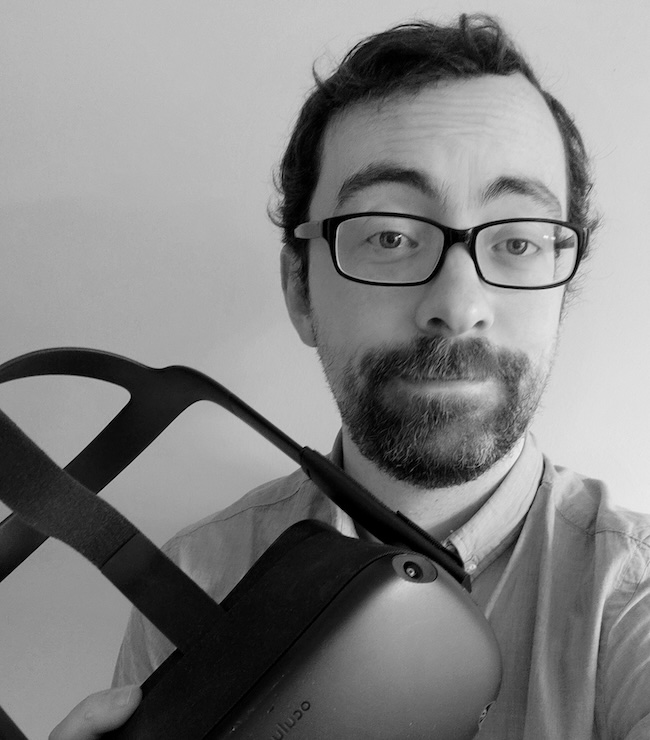A new research project is setting out to explore the positive and negative effects that future generations of augmented reality technologies could have on society.
Augmented reality (AR), which overlays digital displays onto real-life scenes through computer screens or via headsets, is expected to become as ubiquitous as smartphones in the years to come as the technology develops.
Unlike smartphones, which can be tucked away in pockets when not in use, future augmented reality devices will take the form of wearable devices like discreet ‘smart glasses’, which could replace the physical displays currently required for many work, leisure and social activities.
AR devices will provide wearers with an always-on display which alters their perception of the world. The AR overlays could create everything from small pop-up message notifications to complete replacement of users’ field of vision.

Dr Mark McGill
Dr Mark McGill, from the University of Glasgow’s School of Computing Science, has won a Starter Grant from the European Research Council - which was subsequently funded by the UKRI Horizon Guarantee scheme - to investigate how a future ‘augmented society’ might provide people with new opportunities, as well as subject them to new potential for harms. Dr McGill will work with Dr Graham Wilson and Dr Joseph O’Hagan, also of the School of Computing Science, on the project.
The team will explore how new forms of social good could come from widespread use of AR, such as augmenting users’ intelligence by providing them with timely and useful information about what they see in front of them in the real world. AR could also promote enhanced self-expression by allowing users to tailor how others see them in virtual spaces, which the researchers suggest could benefit people with disabilities or aid people in the process of socially transitioning to their chosen gender. Disabled people could also benefit from AR’s potential to help them see the world in ways which take their needs more fully into account. Communities could benefit from working together to virtually enhance real-world spaces, creating a kind of ‘digital urban renewal’
Some of the potential AR risks the researchers will examine include the potential for devices’ always-on cameras to infringe on privacy; how AR could amplify the spread of online misinformation and negatively influence behaviour and how AR’s perception-altering properties could manipulate users by by directing their attention, or blocking or replacing aspects of reality.
The AUGSOC project will also explore the implications of the technology for human rights, and what a new charter to ensure AR is deployed as safely as possible may look like.
Some of the ethical considerations the team will explore include perceptual agency, informing users’ right to control what they see through AR devices; perceptual integrity, the right to accurate, ethical and trustworthy AR experiences; and AR-specific free will, which would protect users from non-consensual manipulation by malicious actors.
Dr McGill said: “Augmented reality has huge potential to reshape the way we experience the world, which makes it a powerful potential agent for social change.
“Just how positive or negative those changes will be is something that we need to think very carefully about now, before AR technology outpaces society’s ability to adapt and legislate appropriately. We can’t run the risk of reacting to AR harms after they’ve happened – we need to put the proper guidelines in place long before the technology becomes as common as smartphones are today.
“AUGSOC will aim to provide a comprehensive map of the benefits and harms of AR to help governments, lawmakers, tech companies and other decisionmakers unlock the benefits of AR while minimising the risks. Being as informed as we can be about the promise and perils of AR will help us ensure risks can be mitigated in advance.
“We’ll also work to train a new generation of experts working at the intersection of human-computer interaction, extended reality, privacy and ethics, all of which are vitally important considerations as the real world continues to merge seamlessly with the digital domain.”
AUGSOC will be part of the School’s rapidly-expanding base of augmented reality research. Other Glasgow AR projects supported by European Research Council funding include Dr Julie Williamson’s FUSION project, which is creating immersive new forms of online social interaction, and Professor Stephen Brewster’s ViAjeRo, which is developing new ways to use XR to support entertainment, work and collaboration while people are travelling.
For more information on AUGSOC, visit https://augsoc-project.org
First published: 4 February 2025




